Help! My Dog Has Diarrhea: A Complete Guide to Understanding and Treating Dog Diarrhea

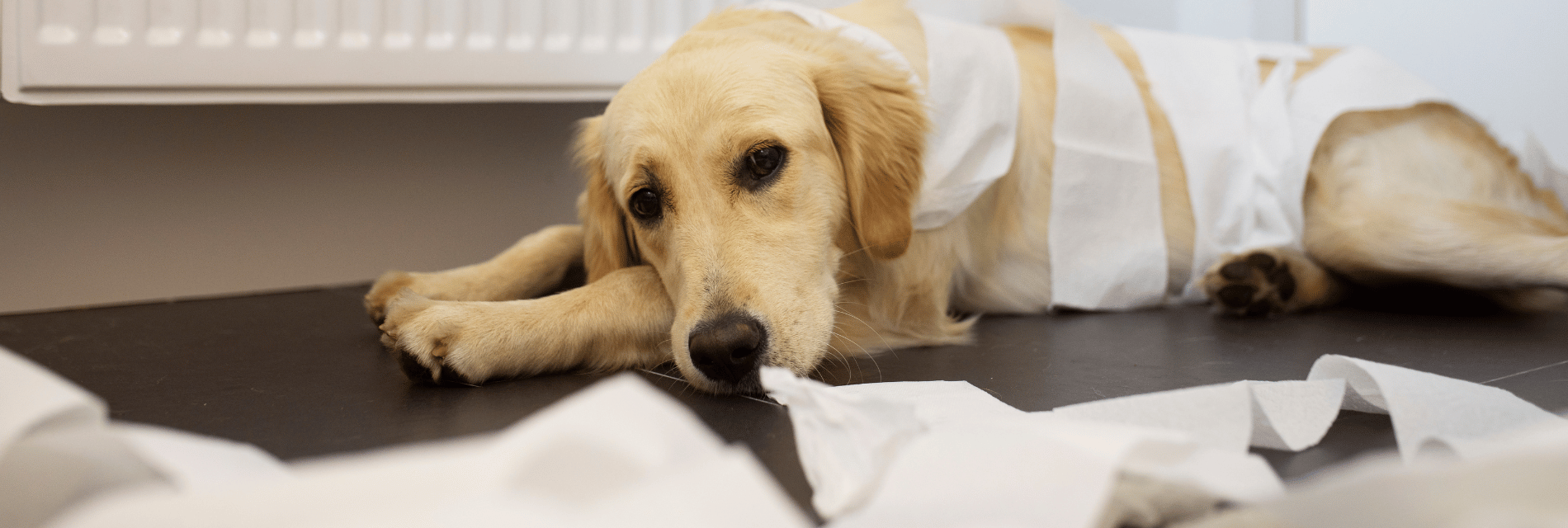
Let’s face it; no one enjoys dealing with dog diarrhea. It’s messy, smelly, and can be downright stressful for both you and your pup. But fear not, pet parents!
This complete guide will equip you with the knowledge to understand why your dog might have diarrhea and how to help them get back to feeling their best in no time.
We’ll cover everything from common causes to home remedies and when to seek veterinary attention. So grab a doggy bag, and let’s explore how to deal with dog diarrhea effectively.
What is dog diarrhea and What are the Major Causes?
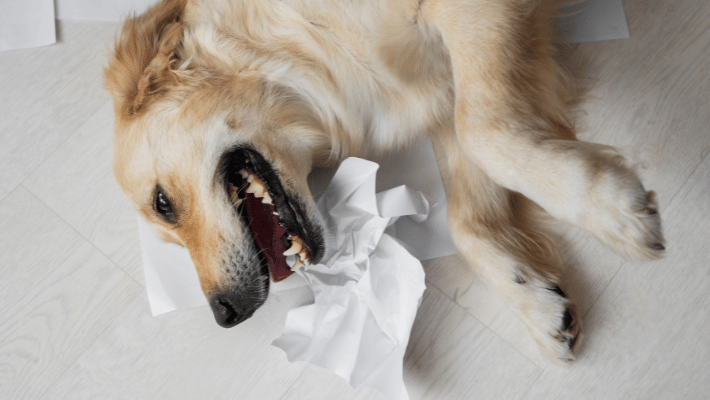
Diarrhea in dogs is a common health condition, so chances are you probably already know what diarrhea is. It is a condition where the body excretes a large amount of loose, watery stool more frequently than usual (at least 3 times a day).
Dogs can get diarrhea due to a variety of reasons ranging from dietary indiscretions to more serious underlying health issues. You need to know about these caiSome of the common causes of dog diarrhea are as follows:
Dietary indiscretion
Our furbabies have a habit of nibbling on things that are not meant for them, such as table scraps, spoiled food, trash, and even toxins such as essential oils. Because of this habit of theirs, when they eat something that disagrees with their stomach, it upsets and irritates their stomach and intestines.
This irritation can inflame the lining of the digestive tract, making it difficult for the body to properly absorb fluids and nutrients from food. This excess fluid ends up moving through the intestines too quickly, resulting in diarrhea.
Sudden change in diet
A healthy dog’s gut has a balanced community of bacteria that aids digestion. When a dog eats something outside its normal diet, this balance can be disrupted. These imbalanced gut bacteria can irritate the intestines, producing gas and loose stools. These two are often the primary indicators of diarrhea in dogs.
Food Allergies
Sometimes, diarrhea can be a sign of a food intolerance or allergy. In these cases, even a small amount of the offending food can trigger digestive upset. If you suspect your dog has a food intolerance or allergy, consult your veterinarian about a proper diagnosis and dietary changes.
Intestinal Parasites and Infections
Just like with dietary indiscretion, intestinal parasites like giardia, coccidia, roundworms, or hookworms can irritate the lining of the intestines. Roundworms and hookworms, for example, attach themselves to the intestinal wall to feed.
This physical attachment and their feeding habits damage the tissues, causing inflammation. This inflamed and irritated gut lining has difficulty absorbing fluids properly, leading to loose stools and, subsequently, diarrhea.
Aside from parasites, both bacterial and viral infections, such as salmonella, E. coli, parvovirus and coronavirus, can also cause diarrhea.
Underlying health Issues
In some cases, diarrhea can be a symptom of a more serious underlying condition, such as liver disease, kidney disease, or cancer.
What Are the Different Types of Dog Diarrhea
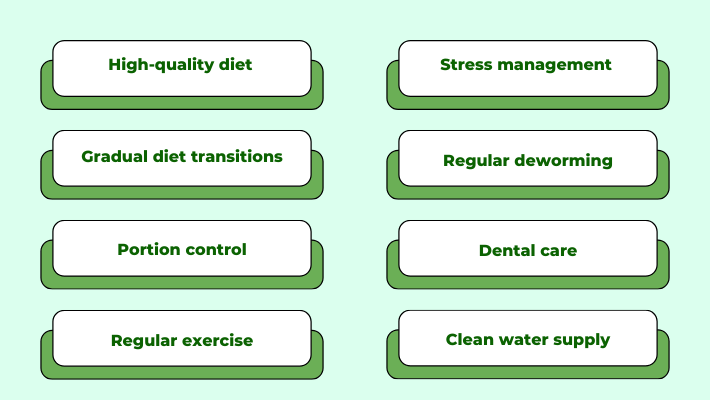
Not all diarrhea cases are created equal. It’s essential to understand the different types of diarrhea to better assess the severity and potential causes.
Acute diarrhea
This type of diarrhea comes on suddenly and may last for a few days. It’s often caused by dietary indiscretions, infections, or stress.
Chronic diarrhea
Chronic diarrhea persists for an extended period, typically more than three weeks. It may indicate an underlying medical condition or a long-term dietary issue.
Small bowel diarrhea
This type of diarrhea is characterized by loose, watery stools and may be accompanied by gas and abdominal discomfort. It’s often caused by issues affecting the small intestine, such as inflammatory bowel disease or bacterial overgrowth.
Large bowel diarrhea
Large bowel diarrhea is associated with frequent, urgent bowel movements and may contain mucus or blood. It’s commonly linked to conditions affecting the colon or rectum, such as colitis or cancer.
Hemorrhagic diarrhea
This type of diarrhea contains fresh blood, which can be a sign of a serious underlying condition, such as a parvovirus infection or a foreign body obstruction.
By understanding the characteristics of your dog’s diarrhea, you can better communicate with your veterinarian and help them identify the potential causes.
When Should You be concerned about Your dog’s diarrhea?
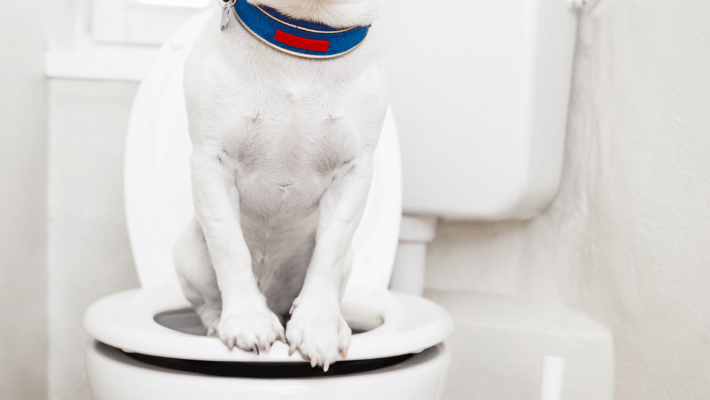
While occasional bouts of diarrhea may be relatively harmless, there are certain situations when you should be concerned and seek veterinary attention:
Chronic or Persistent diarrhea
If your dog’s diarrhea lasts more than a few days or is accompanied by other symptoms like vomiting, lethargy, or loss of appetite, it could be a sign of a more serious issue. It should be evaluated by a veterinarian to rule out any underlying medical conditions.
Bloody diarrhea
The presence of fresh blood in your dog’s stool is a red flag and should be addressed immediately, as it may indicate a severe condition.
Dehydration
Diarrhea can lead to dehydration, especially in puppies or elderly dogs. Watch for signs like sunken eyes, dry gums, and lethargy.
Fever
If your dog has diarrhea accompanied by a fever, it could be a sign of an infection or other underlying condition that requires medical attention.
Sudden onset
If your dog’s diarrhea comes on suddenly and without any apparent cause, it’s best to consult your veterinarian, as it may be a symptom of a more serious issue.
Puppies or senior dogs
Diarrhea can be more dangerous in puppies and senior dogs, as they are more susceptible to dehydration and other complications.
Pre-existing medical conditions
If your dog has a pre-existing medical condition, such as diabetes, kidney disease, or cancer, diarrhea may require more aggressive treatment and monitoring.
By being aware of these concerning signs, you can take prompt action and seek professional help when necessary, potentially preventing further complications.
How do Vets Diagnose dog diarrhea
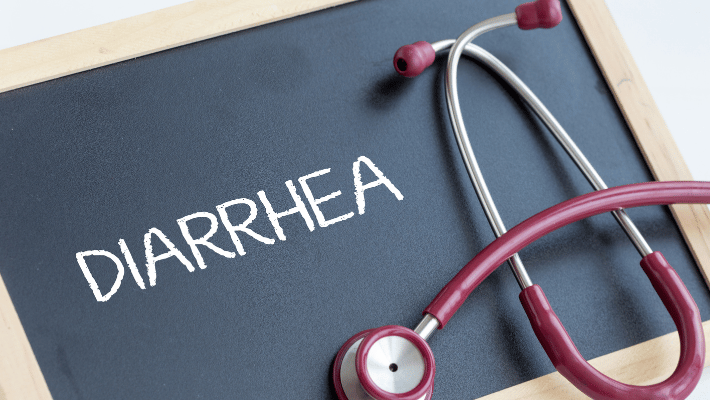
Diagnosing the underlying cause of your dog’s diarrhea is crucial for determining the appropriate treatment. Your veterinarian may employ various diagnostic methods, including:
- Physical examination: Your vet will perform a thorough physical examination, checking for signs of dehydration, abdominal pain, or other potential clues.
- Fecal analysis: A fecal sample may be analyzed for the presence of parasites, bacteria, or other abnormalities that could be causing the diarrhea.
- Blood tests: Blood tests can help detect infections, assess organ function, and identify any underlying metabolic or hormonal imbalances.
- Imaging tests: Depending on the suspected cause, your veterinarian may recommend imaging tests like X-rays or ultrasounds to visualize the digestive tract and identify any abnormalities.
- Endoscopy or biopsy: In some cases, an endoscopic examination or tissue biopsy may be necessary to diagnose conditions like inflammatory bowel disease or cancer.
By combining the results of these diagnostic tests with your dog’s medical history and clinical signs, your veterinarian can often pinpoint the underlying cause and develop an appropriate treatment plan.
Treating dog diarrhea at home

In some cases, mild diarrhea can be managed at home with a few simple steps. However, it’s essential to monitor your dog’s condition closely and seek veterinary attention if the diarrhea persists or worsens.
- Fasting: Withholding food for 12 to 24 hours can help rest the digestive system and allow it to recover. However, ensure your dog has access to fresh water to prevent dehydration.
- Bland diet: After the fasting period, gradually reintroduce a bland diet, such as boiled chicken and rice, or a commercial prescription diet recommended by your veterinarian.
- Probiotics: Supplementing with probiotics can help restore the balance of beneficial bacteria in your dog’s gut, aiding in digestion and potentially alleviating diarrhea.
- Electrolyte replenishment: If your dog is dehydrated, providing an electrolyte solution can help replace lost fluids and minerals.
- Medications: Over-the-counter medications like loperamide (Imodium) or bismuth subsalicylate (Commonly available under the name Pepto-Bismol) may help reduce diarrhea in some cases, but always consult your veterinarian before administering any medication to your dog.
Remember, home treatment should only be attempted for mild cases of diarrhea. If your dog’s condition does not improve within a day or two, or if you notice any concerning symptoms, seek professional veterinary care.
Home remedies for dog diarrhea
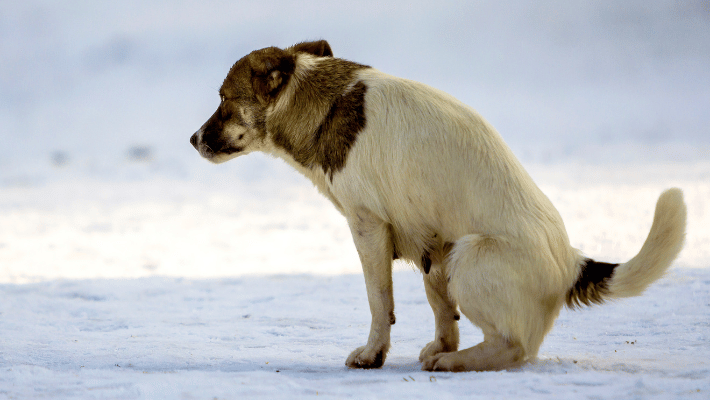
In addition to the at-home treatments mentioned above, there are several natural remedies that may help alleviate your dog’s diarrhea. However, it’s essential to consult with your veterinarian before trying any home remedies, as some may interact with medications or be inappropriate for certain conditions.
- Pumpkin or canned pumpkin puree: Pumpkin is rich in fiber and can help firm up loose stools. Start with a small amount and gradually increase as needed.
- Slippery elm bark powder: This natural supplement can help soothe and coat the digestive tract, potentially reducing inflammation and diarrhea.
- Ginger: Ginger has anti-inflammatory and digestive-soothing properties that may help alleviate diarrhea. You can offer ginger tea or ginger supplements, but consult your vet for proper dosing.
- Bone broth: Bone broth is easy to digest and can help replenish electrolytes and nutrients lost through diarrhea.
- Yogurt or kefir: These probiotic-rich foods can help restore the balance of beneficial bacteria in your dog’s gut, potentially alleviating diarrhea.
- Chamomile tea: Chamomile has anti-inflammatory and soothing properties that may help calm an upset stomach and reduce diarrhea.
Remember, while these home remedies may provide relief, they should not be used as a substitute for veterinary care if your dog’s condition is severe or persists.
Your veterinarian can perform a thorough examination, run diagnostic tests, and provide appropriate treatment, which may include medications, fluid therapy, or dietary adjustments, depending on the underlying cause.
Common medications for treating dog diarrhea
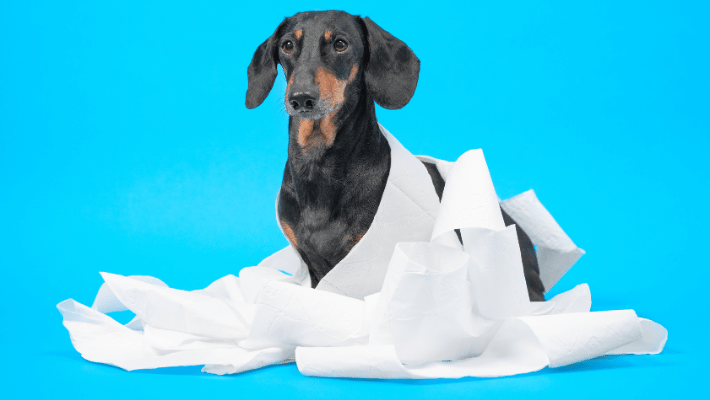
In some cases, your veterinarian may prescribe medications to help manage your dog’s diarrhea and address the underlying cause. Here are some common medications used for treating dog diarrhea:
- Antibiotics: If your dog’s diarrhea is caused by a bacterial infection, your veterinarian may prescribe antibiotics to eliminate the pathogen.
- Anti-inflammatory drugs: Medications like corticosteroids or non-steroidal anti-inflammatory drugs (NSAIDs) may be prescribed to reduce inflammation in the digestive tract, particularly in cases of inflammatory bowel disease or colitis.
- Antidiarrheal agents: Medications like loperamide (Imodium) or diphenoxylate can help slow down the movement of the intestines and reduce diarrhea.
- Probiotics: Probiotic supplements or medications containing beneficial bacteria can help restore the balance of gut flora and improve digestion.
- Antiparasitic drugs: If your dog’s diarrhea is caused by a parasitic infection, your veterinarian may prescribe antiparasitic medications to eliminate the parasites.
- Dietary supplements: Your veterinarian may recommend dietary supplements, such as fiber, digestive enzymes, or prebiotics, to support your dog’s digestive health.
It’s important to follow your veterinarian’s instructions carefully when administering any medication to your dog and to report any side effects or lack of improvement promptly.
Preventing dog diarrhea through diet and lifestyle changes
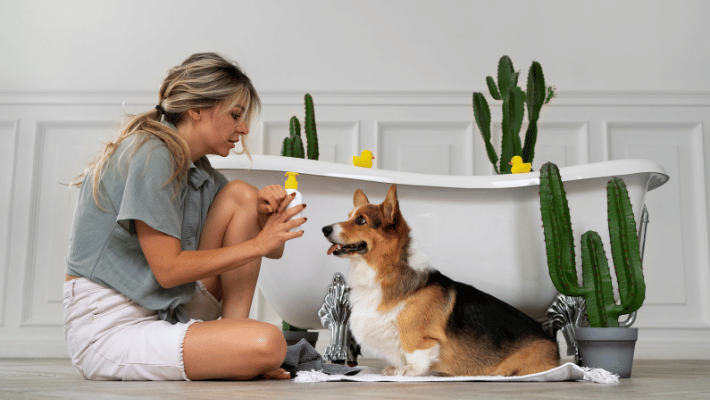
While diarrhea can occur despite our best efforts, there are several steps you can take to help prevent or reduce the likelihood of your dog experiencing digestive issues:
- High-quality diet: Feeding your dog a high-quality, balanced diet appropriate for their age, breed, and activity level can help maintain a healthy digestive system.
- Gradual diet transitions: When switching to a new food, gradually introduce it over a period of several days to allow your dog’s digestive system to adjust.
- Portion control: Overfeeding or allowing your dog to eat too quickly can lead to digestive upset. Follow the recommended portion sizes and consider using a slow feeder bowl.
- Regular exercise: Moderate exercise can help promote regular bowel movements and maintain a healthy digestive system.
- Stress management: Reducing stress and anxiety in your dog’s environment can help prevent stress-related diarrhea.
- Regular deworming: Follow your veterinarian’s recommendations for routine deworming to prevent parasitic infections that can cause diarrhea.
- Dental care: Good dental hygiene can prevent your dog from ingesting harmful bacteria that may lead to digestive issues.
- Clean water supply: Ensure your dog has access to fresh, clean water at all times to support proper hydration and digestion.
By implementing these preventive measures, you can help reduce the risk of diarrhea and promote overall digestive health in your furry companion.
Final Thoughts
Diarrhea in dogs can be a frustrating and messy issue, but it’s essential to address it promptly and appropriately. By understanding the potential causes, recognizing concerning symptoms, and seeking veterinary care when necessary, you can help your furry friend recover quickly and maintain optimal digestive health.
Remember, prevention is key. Providing a high-quality diet, regular exercise, and a stress-free environment can go a long way in supporting your dog’s digestive system and reducing the likelihood of diarrhea episodes.
Read Also:









Leave A Comment